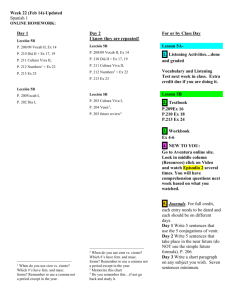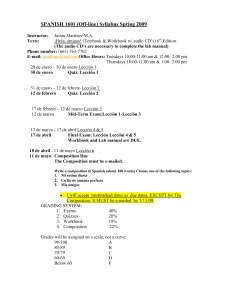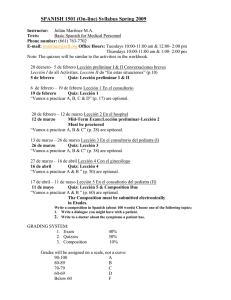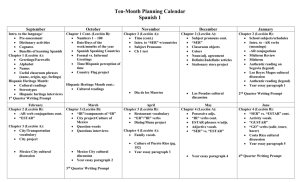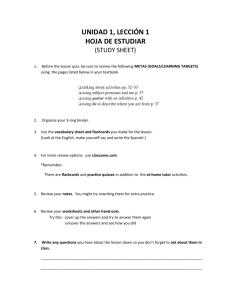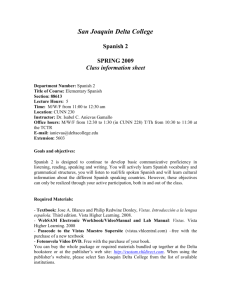Document 17717902
advertisement
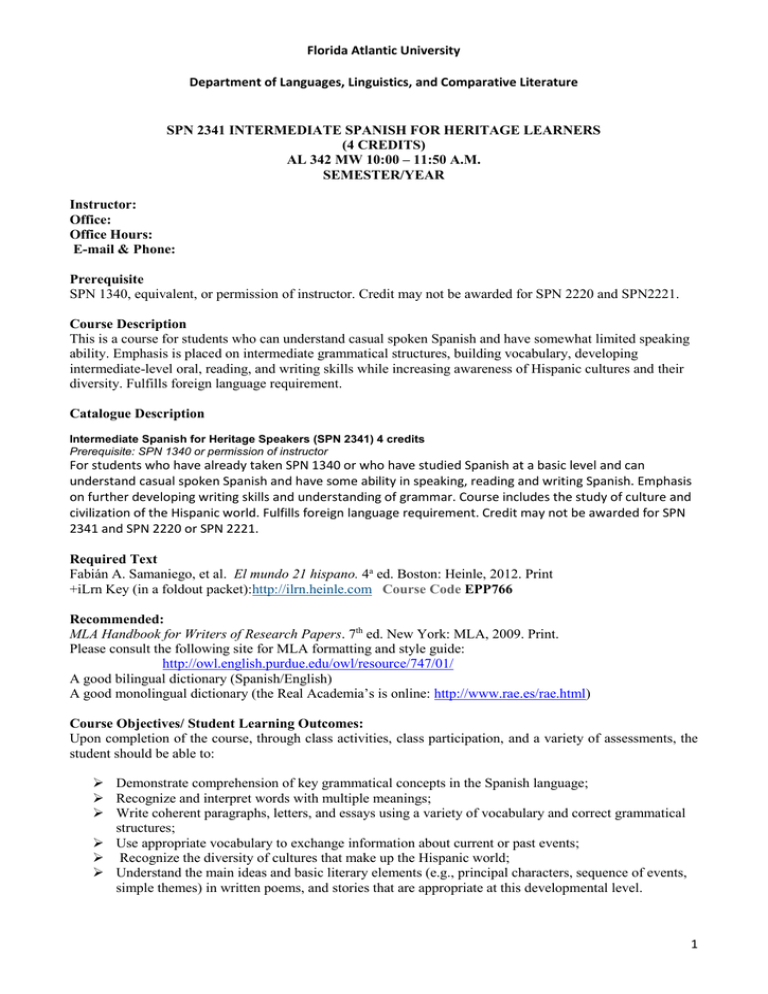
Florida Atlantic University Department of Languages, Linguistics, and Comparative Literature SPN 2341 INTERMEDIATE SPANISH FOR HERITAGE LEARNERS (4 CREDITS) AL 342 MW 10:00 – 11:50 A.M. SEMESTER/YEAR Instructor: Office: Office Hours: E-mail & Phone: Prerequisite SPN 1340, equivalent, or permission of instructor. Credit may not be awarded for SPN 2220 and SPN2221. Course Description This is a course for students who can understand casual spoken Spanish and have somewhat limited speaking ability. Emphasis is placed on intermediate grammatical structures, building vocabulary, developing intermediate-level oral, reading, and writing skills while increasing awareness of Hispanic cultures and their diversity. Fulfills foreign language requirement. Catalogue Description Intermediate Spanish for Heritage Speakers (SPN 2341) 4 credits Prerequisite: SPN 1340 or permission of instructor For students who have already taken SPN 1340 or who have studied Spanish at a basic level and can understand casual spoken Spanish and have some ability in speaking, reading and writing Spanish. Emphasis on further developing writing skills and understanding of grammar. Course includes the study of culture and civilization of the Hispanic world. Fulfills foreign language requirement. Credit may not be awarded for SPN 2341 and SPN 2220 or SPN 2221. Required Text Fabián A. Samaniego, et al. El mundo 21 hispano. 4a ed. Boston: Heinle, 2012. Print +iLrn Key (in a foldout packet):http://ilrn.heinle.com Course Code EPP766 Recommended: MLA Handbook for Writers of Research Papers. 7th ed. New York: MLA, 2009. Print. Please consult the following site for MLA formatting and style guide: http://owl.english.purdue.edu/owl/resource/747/01/ A good bilingual dictionary (Spanish/English) A good monolingual dictionary (the Real Academia’s is online: http://www.rae.es/rae.html) Course Objectives/ Student Learning Outcomes: Upon completion of the course, through class activities, class participation, and a variety of assessments, the student should be able to: Demonstrate comprehension of key grammatical concepts in the Spanish language; Recognize and interpret words with multiple meanings; Write coherent paragraphs, letters, and essays using a variety of vocabulary and correct grammatical structures; Use appropriate vocabulary to exchange information about current or past events; Recognize the diversity of cultures that make up the Hispanic world; Understand the main ideas and basic literary elements (e.g., principal characters, sequence of events, simple themes) in written poems, and stories that are appropriate at this developmental level. 1 Florida Atlantic University Department of Languages, Linguistics, and Comparative Literature Grade Components: Exams (4) Quizzes (4) Homework (exam) Participation Short papers (3) Oral presentation & video Final exam 30% 5% 15% 10% 15% 5% 20% Grading Scale: Points Letter Grade 93-100 90-92 87-89 83-86 80-82 77-79 73-76 70-72 67-69 A A- B+ B B- C+ C C- D+ 63-66 D Attendance Policy and Participation In registering for classes at the university students accept responsibility for attending scheduled class meetings, completing assignments on time, and contributing to class discussion and exploration of ideas. Students must be in class on- time and for the duration of each class session. Only two absences allowed during the semester. Each additional absence will lower the grade by one-half grade. Two late arrivals or early departures will count as one absence. Students who walk into the classroom late distract other students in the learning environment. Non-penalized Absences: You will not be penalized for being absent from class because of (1) a religious holiday in your own faith, (2) serious illness, (3) death in your immediate family, (4) attendance to statutory governmental responsibilities (such as jury duty), (5) Prior approved and properly documented Universitysponsored activities that demand your presence. However, you must provide prior notification, and you must present written documentation for 3 & 4 upon your return to class. However, you may be withdrawn for excessive absences even if some are excused. You are responsible for the material covered in your absence. If you find it necessary to withdraw, you must do so officially through the Registrar’s Office. If you stop attending without officially withdrawing, you may receive an “F” as your final grade. Students are expected to come prepare to class. Students should do the readings or review the material before class in order to have a better discussion during class. Participation also includes several in-class activities from the textbook or workbook that will be completed in class. No excuses will be accepted to recover participation points lost because of absences. Preparation and class participation. Preparation and class participation are indispensable for the achievement of the objectives of this course. Students are expected to complete any assigned work before class as well as bring their copy of the textbook to each class meeting. Make - Ups Make-up exams will be permitted only under extenuating circumstances and only with prior notification and documentation (original funeral notice, original doctor note, etc.). The instructor reserves the right to create alternate make-up exams for students who are not able to take the scheduled, on-campus exams. Class work and participation grades cannot be recuperated. Make-up work is permitted only when proper documentation can be provided. Students excused for official 2 Florida Atlantic University Department of Languages, Linguistics, and Comparative Literature university business must arrange to turn in assignments and take tests before his or her absence. Class work and participation grades cannot be recuperated Exams: There are lesson exams (4) that correspond with the textbook. They are announced on the Course Schedule and will be held in the room and class period in which class is held. No deviation of this schedule will be allowed. This means NO early or late exams. If you cannot take an announced exam due to a documented emergency, written proof of the circumstances must be presented to your instructor no later than one week after you return to class. See the “Make-up Procedures: Exams / Assignments” section for details. Quizzes (4): Each quiz will cover material from specific chapters of the book. The pedagogical purpose of these quizzes is to ensure that you have read and understood the textbook chapters Homework (eSAM): These are very important for you to develop your skills and you should review the various study tools available to you via iLrn (grammar tutorials, iRadio Podcasts, Google Earth, iTunes). These are due by the assigned dates (11:59 pm on Tuesdays or Thursdays). Short papers/compositions: Each student will be required to submit three papers (2 pages long). These must be typed and must follow MLA guidelines (7th edition) for formatting (double spacing, Times Roman 12, 1”margins, running headers, etc.). Video project: In groups of no more than three people, students will write, produce, and tape a short film (35 minutes) that will be screened in the last week of classes. These shorts can be inspired in some of the movies included in the course. They can also be completely up to the creativity of the students. Mandatory Comprehensive Final Examination (20%) The final examination incorporates all course material and is required for a passing grade. You are advised not to make other commitments at this time. If you do not take the final exam, you will fail the course for the semester. Late Work: All assignments must be submitted by the assigned date. No homework/assignments will be accepted via email. Classroom Etiquette Policies: Cell Phones and Electronic Devices: University Policy: “In order to enhance and maintain a productive atmosphere for education, personal communication devices, such as cellular telephones and pagers, are to be disabled in class sessions.” The use of cell phones and electronic devices is prohibited in class. All cell phones should be turned off before the start of class (not set on “vibrate”, but turned OFF). If you have a medical or family emergency and need to receive a call during class, you should inform your instructor before class. Students without authorization who use cell phones and electronic devices in class may be dismissed from class and counted as being absent for the day. In order that the University may notify students of a campus-wide emergency, either the instructor’s, or a designated student’s cell phone will be set to vibrate during class. If a student is caught with his/her phone out or sending messaging, it will be taken away till the end of class. The second time the student is caught, he/she will be asked to leave the class. Student E-Mail Policy: Effective August 1, 2004, FAU adopted the following policy: “When contacting students via e-mail, the University will use only the student’s FAU e-mail address. This will ensure that e-mail messages from FAU administration and faculty can be sent to all students via a valid address. E-mail accounts are provided automatically for all students from the point of application to the 3 Florida Atlantic University Department of Languages, Linguistics, and Comparative Literature University. The account will be disabled one year post-graduation or after three consecutive semesters of nonenrollment.” E-mailing Your Instructor: Please use your FAU account when e-mailing your instructor. If you use a personal e-mail account (e.g., hotmail, yahoo, g-mail, etc.) your instructor will not know whether the message is junk mail, and therefore, will not respond. FAU e-mail is considered by the university to be official communication, and you should therefore address your instructor appropriately (e.g., Dear Professor, etc.), sign your name, and use a respectful tone. Instructors will not respond to e-mails that do not address them directly, and/or are not signed, and/or are not sent from your official FAU e-mail address. ACADEMIC IRREGULARITIES AND HONOR CODE “Students at Florida Atlantic University are expected to maintain the highest ethical standards. Academic dishonesty, including cheating and plagiarism, is considered a serious breach of these ethical standards, because it interferes with the University mission to provide a high quality education in which no student enjoys an unfair advantage over any other. Academic dishonesty is also destructive of the University community, which is grounded in a system of mutual trust and places high value on personal integrity and individual responsibility. Harsh penalties are associated with academic dishonesty. For more information, see http://wise.fau.edu/regulations/chapter4/4.001_Code_of_Academic_Integrity.pdf Plagiarism 1. The presentation of words from any other source or another person as one’s own without proper quotation and citation. 2. Putting someone else’s ideas or facts into your own words (paraphrasing) without proper citation. 3. Turning in someone else’s work as one’s own, including the buying and selling of term papers or assignments. : http://www.lib.usm.edu/legacy/plag/plagiarismtutorial.php. Students are expected to uphold the Academic Honor Code. ALL assignments that you turn in to your instructor for a grade must be your own work. This means that the use of translator programs, excessive help from tutors or anyone else on graded assignments constitutes academic dishonesty. If your instructor suspects that an assignment completed outside of class is not entirely your own work, your instructor has the right to ask you to redo that assignment in his or her presence during office hours. ACADEMIC DISHONESTY ON ALL ASSIGNMENTS AND EXAMS IS GROUNDS FOR FAILURE IN THE COURSE. By remaining enrolled in this course past the end of Drop /Add, you are agreeing to: uphold The Academic Honor System of Florida Atlantic University, and Accept accountability for the course requirements, the course expectations, and the attendance policy stated in this document. Attend the final exam which takes place as scheduled by the University. Copyright This course may contain copyright protected materials such as audio or video clips, images, text materials, etc. These items are being used with regard to the Fair Use doctrine in order to enhance the learning environment. Please do not copy, duplicate, download or distribute these items. The use of these materials is strictly reserved for this online classroom environment and your use only. All copyright materials are credited to the copyright holder. Disability Statement 4 Florida Atlantic University Department of Languages, Linguistics, and Comparative Literature Americans with Disabilities Act (ADA):“In compliance with the Americans with Disabilities Act (A.D.A).,students who require special accommodations due to a disability to properly execute coursework must register with the Office for Students with Disabilities (OSD) located in Boca SU 133 (561-2973880), and follow all OSD procedures.” Bring a letter to your instructor from the OSD indicating that you need academic accommodations no later than the second week of classes. In accordance with the OSD’s rules and regulations, students must turn in an Exam Sign-Up Sheet at least one week before the date on which each exam is scheduled. Please contact OSD for more information. To drop the class, please go to: http://myfau.fau.edu. Your instructor will not drop you, but will document your attendance in the event the Financial Aid office requests it. If you do not drop the class before the last day to drop a course without receiving an “F,” the instructor assigns an “F.” The Spanish section will not support petitions to drop AFTER the deadlines. Links that can help: http://www.studyspanish.com/ http://www.wordreference.com/ CALENDARIO DEL CURSO Semana/Fecha Semana 1 Lunes 6 de enero Miércoles 8 de enero Semana 2 Lunes 13 de enero Miércoles 15 de enero En clase Presentaciones Examen diagnóstico (en clase) Introduction Lección 1 Estados Unidos y Puerto Rico Los orígenes pag. 4-7 Mejoremos la comunicación 8-9. Continuar Lección 1 Ayer ya es hoy pg/ 10-11 Gramática pg. 18-25 ¡Luces! !Cámara! ¡Acción! Pg. 14 Y ahora, ¡A leer! Pg. 15-17. Continuar Lección 1 Puerto Rico pag. 26-27 Mejoremos la comunicación pg. 28-29 Ayer ya es hoy pg. 30-31. Escribamos ahora pg. 34. En casa/tareas Registrarse en: http://hlc.quia.com/books/ para hacer su tarea Tarea eSAM Domingo, 12 de enero Tarea eSAM martes, 14 de enero Tarea eSAM Domingo, 19 de enero Martin Luther King No hay asistencia Tarea eSAM Martes 21 de enero Miércoles 22 de enero Continuar Lección 1 Y Ahora, !A Leer! 35-38 El cine nos encanta: Victoria para chino Un cortometraje de Cary Joji Fukunaga pag. 39-42 Tarea eSAM Domingo, 21 de enero Semana 4 Lunes 27 de enero Continuar Lección 1 Gramática pag. 43-49 Repaso para el examen de la Lección 1 Tarea eSAM Martes, 28 de enero Semana 3 Lunes 20 de enero 5 Florida Atlantic University Department of Languages, Linguistics, and Comparative Literature Miércoles 29 de enero Examen - Lección 1 Entregar trabajo escrito #1 Semana 5 Lunes 3 de febrero Lección 2 España y México Los orígenes pg. 52-55 Tarea eSAM Martes, 4 de febrero Miércoles 5 de febrero Continuar Lección 2 Mejoremos la comunicación pg. 56-57 Ayer ya es hoy pg. 58-59 Tarea eSAM Domingo, 4 de febrero Semana 6 Lunes 10 de febrero Continuar Lección 2 Y Ahora, ¡A leer! 63-66 Gramática 67-71 Tarea eSAM Martes. 11 de febrero Continuar Lección 2 México pg. 72-73 Mejoremos la comunicación Ayer ya es hoy pg. 76 – 77 Escribamos ahora pg. 80 Gramática pg. 89-92 Tarea eSAM Domingo, 16 de febrero Semana 7 Lunes 17 de febrero Continuar Lección 2 Y Ahora, ¡A leer! Pg. 81-84 El cine nos encanta Ana y Manuel un cortometraje de Manuel Calvo pg. 85-88 Gramática pg. 93-95 Repaso para el examen de la lección 2. Tarea eSAM Martes, 18 de febrero Miércoles 19 de febrero Examen – Lección 2 Semana 8 Lunes 24 de febrero Lección 3 Perú Bolivia y Ecuador Los orígenes pg. 100-103 Gramática pg. 114-117 Continuar Lección 3 Mejoremos la comunicación pg. 104-105 Ayer ya es hoy pg. 106-107 Gramática pg.118-119 Y ahora ¡A leer! Pg. 111-113 Miércoles 12 de febrero Miércoles 26 de febrero Semana 9 Lunes 10 de marzo Continuar Lección 3 Bolivia Mejoremos la comunicación 122- 123 Ayer es hoy pg. 124 Gramática pg. 132-133 Tarea eSAM Martes 25 de febrero Tarea eSAM Domingo, 9 de marzo Tarea eSAM Martes, 11 de marzo 6 Florida Atlantic University Department of Languages, Linguistics, and Comparative Literature Miércoles 12 de marzo Semana 10 Lunes 17 de marzo Miércoles 19 de marzo Semana 11 Lunes 24 de marzo Miércoles 26 de marzo Semana 12 Lunes 31 de marzo Miércoles 2 de abril Semana 13 Lunes 7 de abril Miércoles 9 de abril Continuar Lección 3 Ecuador Mejoremos la comunicación pg. 136-136 Ayer es hoy Escribamos ahora pg. 142 Ahora ¡A leer! Pg. 143-145 Repaso para el examen de la lección 3 Tarea eSAM Domingo, 16 de marzo Entregar trabajo escrito #2 Examen – Lección 3 Lección 4 Chile y Argentina Los orígenes pg. 154-157 Mejoremos la comunicación pg. 158-59 Gramática pg. 168-170 ¡Luces! ¡Cámara! ¡Acción! Tarea eSAM Domingo, 23 de marzo Continuar Lección 4 Y ahora, ¡A leer! Pg. 165-67 Gramática pg. 170-71 Argentina Mejoremos la comunicación pg. 174-74 Continuar Lección 4 Ayer Ya es hoy pg. 176-1-77 Escribamos ahora pg. 180 Tarea eSAM Martes, 25 de marzo Continuar Lección 4 Gramática pg. 189-95 El cine nos encanta: Un juego absurdo cortometraje de Gastón Rothschild Repaso para el examen de la lección 4 Tarea eSAM Domingo, 30 de marzo Tarea eSAM Martes, 1 de abril Examen – Lección 4 Lección 5 Paraguay y Uruguay Los orígenes pg. 200-203 Mejoremos la comunicación 204-05 Gramática pg. 215-20 Tarea eSAM Martes, 6 de abril Entregar trabajo escrito #3 Continuar Lección 5 Uruguay Mejoremos la comunicación 224- 25 Ayer es hoy Gramática pg. 235--237 Tarea eSAM Domingo, 13 de abril 7 Florida Atlantic University Department of Languages, Linguistics, and Comparative Literature Semana 14 Lunes 14 de abril Miércoles 16 de abril Continuar Lección 5 Escribamos ahora pg. 230 Y ahora, ¡A leer! 231-34 Presentaciones y videos Semana 15 Lunes 21 de abril Miércoles 23 de abril Continuar Lección 5 Y ahora, ¡A leer! 231-34 Tarea eSAM Martes, 15 de abril Tarea eSAM Domingo, 20 de abril Tarea eSAM Martes, 22 de abril Repaso para el examen final 8
